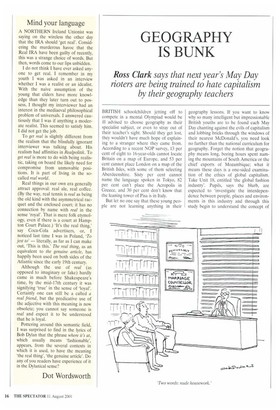Mind your language
A NORTHERN Ireland Unionist was saying on the wireless the other day that the IRA should 'get real'. Considering the murderous havoc that the Real IRA have been guilty of recently, this was a strange choice of words. But then, words come to our lips unbidden.
I do not think I have ever asked anyone to get real. I remember in my youth I was asked in an interview whether I was a realist or an idealist. With the naive assumption of the young that elders have more knowledge than they later turn out to possess, I thought my interviewer had an interest in the mediaeval philosophical problem of universals. I answered cautiously that I was if anything a moderate realist. This seemed to satisfy him. I did not get the job.
To get real is slightly different from the realism that the blissfully ignorant interviewer was talking about. His realism had affinities in Realpolitik. To get real is more to do with being realistic, taking on board the likely need for compromise from unmovable positions. It is part of living in the socalled real world.
Real things in our own era generally attract approval: real ale, real coffee. (By the way, real tennis is real as being the old kind with the asymmetrical racquet and the enclosed court; it has no connection by name with real in the sense 'royal'. That is mere folk etymology, even if there is a court at Hampton Court Palace.) It's the real thing,' say Coca-Cola advertisers, or, I noticed last time I was in Poland, 'To jest to' — literally, as far as I can make out, 'This is this.' The real thing, as an equivalent to the genuine article, has happily been used on both sides of the Atlantic since the early 19th century.
Although the use of real (as opposed to imaginary or fake) hardly came in much before Shakespeare's time, by the mid-17th century it was signifying 'true' in the sense of 'loyal'. Certainly one can still be a called a real friend, but the predicative use of the adjective with this meaning is now obsolete; you cannot say someone is real and expect it to be understood that he is loyal.
Pottering around this semantic field, I was surprised to find in the lyrics of Bob Dylan that the phrase where it's at, which usually means 'fashionable', appears, from the several contexts in which it is used, to have the meaning 'the real thing', 'the genuine article'. Do any of you readers have experience of it in the Dylanical sense?
Dot Wordsworth


























































 Previous page
Previous page